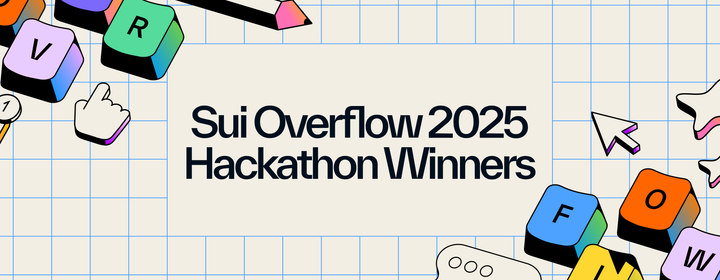Play Beyond: How Asset Ownership Makes Games Better
A conversation with Bill Allred, Director of Gaming Product at Mysten Labs, on what makes a game great and how Sui can enhance the gaming experience

Last week we sat down with Mysten Labs' Director of Gaming Product Bill Allred to discuss why Sui is so well-suited to games. He shared his thoughts on the key innovations that make Sui's next generation blockchain infrastructure and the value it brings to game developers looking to bring the games they imagine to life.
Can you share your thoughts on what qualities make certain games particularly compelling to a gamer?
There’s a framework that game designers refer to often called Bartle’s Taxonomy. This paper was published many years ago and it describes four player types. It's a good starting point for thinking about what makes a game fun or what draws a player to a game. The four types are achiever, explorer, socializer, and in the original paper, I believe he called the fourth archetype killer. It's a bit aggressive so sometimes folks update that to competitor.
Achievers are primarily motivated by progressing. They're competing against themselves and against the game world. They want to collect achievements. They want to level up their character. Explorers are primarily motivated by discovering the in-game world, so they spend a lot of time wanting to discover everything that the game offers. They tend to gravitate towards open world games, or games that are less on rails, games that have more of an open structure. Socializers are more drawn towards interacting with other players. A lot of casual games fit into this genre, but you also see competitive games with social coordination that fit that category as well. And then the final category is people that just want to win. They want to beat other players.
Obviously, games and players are complex, so no game or no player fits neatly into one of only four categories. But most games, and certainly most games that reach really sizable audiences, have modes or aspects of gameplay that speak to each of these personas and have really elegant ways of enabling different player types to interact with each other.
What are some of the benefits and challenges of incorporating blockchain technology into games? Does it help boost the ability to design for these four personas?
I don't think of the infrastructure as specific to a persona. Infrastructure really just applies broadly to a category of products like games. Games in their very earliest forms were physical cartridges that people bought from a store. They would play, and when they were done, they would trade the cartridge with a friend. They would consign it at the store and get some of their money back to go buy a new game. The idea of consuming all of the content, and then being able to do something with that game when you were done playing with it was part of the game itself. That was a big part of the social experience of being a gamer.
Then the industry gradually started moving towards digital downloads and free-to-play. We typically talk about free-to-play in the context of mobile, but free-to-play has been around a lot longer than that. It is more than a business model. It's a distribution model. If you can offer players a taste of the game, and then charge them when they want to consume more of it, that's a great model for distributing digital content. So for the last several years, the primary business model in gaming has been free-to-play games. We give away the game and then we charge for certain digital assets and experiences within the game.
All else equal, a digital asset that you own is better than one you don't own. It really is as simple as that in my mind. I got my start in games at Zynga. We watched people have really meaningful experiences playing simple casual games, where they would buy digital assets to express their personality, to interact with friends, to enhance gameplay within the structure of the game that they had chosen. But every game has a lifecycle. And when that game's lifecycle came to an end, the player really didn't have anything to show for their efforts. They weren't able to retain those digital assets that they had earned. I think that blockchain infrastructure is simply an evolution of the free-to-play business model. It takes this same model of giving away digital content and charging for other digital content and makes it better by adding property rights and the benefits of ownership to those assets.
For developers I think there are potential benefits as well. Any game that reaches a certain level of economic activity will create its own gray market. There's a market for in-game assets that the developer does not directly control. Blockchain rails are a way for a developer to participate in the economic activity they've created that’s taking place outside of their game. It's a really interesting way for developers to redefine the value exchange between themselves and their players.
Any other particular features you want to call out that improve the user experience and/or the developer experience?
Sui is a next generation blockchain, if you consider blockchains over a couple of major generations. Bitcoin invented the concept of digital currency. Prior to Bitcoin, there were all sorts of problems with sending money online. Bitcoin’s fundamental innovation was figuring out how to solve things like the double spending problem and other core problems in cryptography. And it's an amazing invention. Ethereum came along and popularized the concept of “Wouldn't it be great if software programs could hold money like users can?” So if Bitcoin allowed users to hold money, Ethereum popularized smart contracts that allowed programs to hold currency. That opened up a whole new world of what blockchains were able to do. And with Sui, the concept is “If assets are the primary primitive of a blockchain, what would happen if you built a blockchain that prioritized not just currencies or accounts, but the underlying assets themselves?”
We've seen that the exchange of digital assets has really become a primary use case of blockchains, yet these chains were not designed for non-fungible assets. Sui is designed from the ground up to prioritize the exchange of assets. On Sui, everything is an object. It is built for modern applications, like games, that have complex assets with hierarchical relationships. On Sui objects can own other objects. Say you're playing a game with a hero character and that hero character has an inventory, it has other digital assets that belong to the character. Sui can accurately model those data hierarchies in ways that other blockchains can't. So it gives developers a chance to express the application they want to build without having to work around the fundamental limitations of the chain.
What do you see as the perception of Web3 gaming in the marketplace? Where do you see it heading?
I think great games are great games, regardless of the infrastructure that they're built on. If you pick up your phone and open your favorite game, you're not thinking about if this is hosted on AWS or Google Cloud. It really shouldn't matter to a player. It historically never has. And so I don't make a distinction between Web3 games and games built on other infrastructure. All I care about is building great entertainment experiences in the gaming category. And, you know, I think where we've been and where we're going is that some of the best game talent is coming into this space. Game developers that have built amazing scaled games on other platforms are organically, for their own reasons, choosing to build games on blockchain infrastructure, because they are seeing an ability to give players the experience that they have in their minds.
I think that there have been a couple of false starts in the Web3 gaming world specifically, that showed an over financialization of gaming. Players don't come to games to work. Players come to games to escape. To immerse themselves in another world. To become a different character. It's entertainment at the end of the day, and it competes with other forms of entertainment. So really, all that matters is building great games, and the infrastructure is just an enabling technology to deliver that.
Does player behavior or psychology change with the incorporation of Web3, particularly asset ownership in a game?
That's one of the hypotheses around why blockchain infrastructure makes games better. Mobile developers, in particular, have faced a real uphill battle in the last couple of years because there have been some fundamental changes to how ad tracking technology works on mobile platforms. Those changes have really hampered their abilities to target eligible players. It's become prohibitively expensive to acquire users for many free-to-play mobile games. One of the things that blockchains can do for players is give a greater sense of ownership, possibly leading to higher engagement and/or longer retention. From a developer's point of view that affects your business model. It gives your player a higher lifetime value, which changes the economics of acquiring users.
The core hypothesis is that players will engage differently with assets that they truly own. It becomes a more true extension of themselves in the game world. And that changes their behavior and it changes the innate experience of participating in the game. It feels more like a community that you have ownership in and that you belong to rather than being a tourist.
Blockchain infrastructure has a lot of new concepts, such as opening a wallet or signing transactions, that can potentially be a barrier to entry for new users. How does Sui help developers build a game that can serve these users who just want to play a great game without having to deal with the technicalities of Web3?
Sui is built to allow for new onboarding flows for Web3 applications. Everything from creating a wallet through social login, like your Google ID or Facebook ID, all the way really seamless sponsored transactions that allow one account to pay the gas fees on behalf of another account. For example, a developer can sponsor the first few transactions for a user, and allow that user to potentially skip the really onerous flow of going through KYC on an exchange and converting fiat to tokens. Those of us that have been through that flow know how hard it is. Sui gives developers tools that allow them to abstract the complexity away for the user.
What is your long term vision for gaming on Sui?
That every gamer in the world owns a digital asset secured on Sui.



